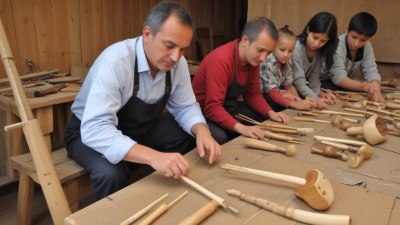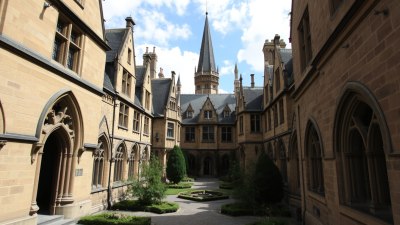Learning to Make Local Musical Instruments in Workshops
Explore the art of crafting local musical instruments in workshops. A hands-on experience to connect with culture and creativity.

This image was created with the assistance of Freepik
Music is a universal language that transcends boundaries and connects people from various cultures. Learning to make local musical instruments in workshops is not only a delightful experience but also an incredible opportunity to engage with musical traditions, community building, and creative expression. Many communities around the world celebrate their heritage through music, and crafting these instruments often leads to a deeper understanding of local culture and history. This article explores the significance of making local musical instruments, the common workshops available, and how participants can benefit from this unique experience.
The process of making musical instruments can be traced back thousands of years, with various forms emerging across different cultures. From the simple flutes made of bamboo to sophisticated string instruments crafted from wood and metal, each instrument has a story to tell. In recent years, interest in handcrafted, local instruments has surged, leading many communities to organize workshops where individuals can learn this age-old craft.
Understanding the Importance of Local Instruments
Local musical instruments often reflect a region's cultural heritage. They carry traditional techniques and are imbued with the stories of the people who play them. Crafting instruments by hand fosters a connection to this heritage, allowing individuals to appreciate not only the sounds that emerge but also the skill and traditions behind their creation. The process encourages respect for the materials and resources, as makers utilize locally sourced wood, reeds, metals, and other components that help to create authentic sounds representative of their culture.
Moreover, these workshops serve as a means of preserving traditional craftsmanship that might otherwise fade in a rapidly modernizing world. By participating in instrument-making workshops, individuals become part of a lineage that supports cultural continuity and education. This hands-on experience often opens doors for individuals to learn from master craftsmen, musicians, and educators who share their expertise and passion.
Types of Workshops
Workshops for making local musical instruments can vary significantly based on the geographical and cultural context. Here are some common types of workshops and the instruments typically crafted within them:
1. String Instrument Workshops
Often focused on traditional strings like guitars, banjos, and lutes, these workshops teach participants about the physics of sound, string tension, and resonance. Participants will learn how to shape the body of the instrument, fit the neck, and string the instrument to produce high-quality sound. Wood selection and finishing techniques are also emphasized. These workshops often delve into the historical significance of each instrument, providing participants with context about its role in local and global music.
2. Percussion Instrument Workshops
Percussion instruments, from drums to marimbas, serve essential rhythmic functions in music. Workshops may focus on creating instruments using natural materials such as animal hides, wood, and clay. Participants will gain insights into different playing techniques, as well as how to create sound through various methods like hitting, scraping, or shaking. Learning rhythmic patterns and how these instruments fit within musical ensembles can enhance participants' overall musical understanding.
3. Wind Instrument Workshops
Wind instruments, such as flutes, clarinets, and trumpets, often rely on air pressure and vibration to produce sound. These workshops teach participants about the intricacies of crafting instruments from materials like bamboo, metal, or other natural components. Participants learn about the proper measurements and finger placements while exploring different breath techniques that enhance their performance. Many workshops also emphasize the cultural significance of wind instruments in local music-making traditions.
4. Electronic Instrument Workshops
As technology evolves, so do musical instruments. Workshops focusing on electronic instruments allow participants to experiment with sound synthesis, sampling, and music production techniques. These workshops blend traditional methods and modern technology, providing a comprehensive exploration of sounds and creativity. Participants can create their own devices and learn about circuits, sound waves, and the digital landscape of music.
The Benefits of Participating in Workshops
Engaging in workshops for making local musical instruments offers numerous benefits, both personal and communal. Here are some key advantages that participants often experience:
1. Skill Development
Crafting musical instruments requires a specific set of skills, including woodworking, fine motor coordination, and a basic understanding of acoustics. Participants practice these skills hands-on, often leading to a sense of accomplishment. Master craftsmen provide guidance, enabling attendees to refine their techniques and develop new skills under expert supervision.
2. Cultural Connection
Individuals can immerse themselves in their local culture by learning about traditional musical instruments and their historical significance. Workshops often include storytelling aspects that educate participants about the origins of the instruments they are creating. This cultural connection can foster pride in cultural identity, and participants may leave with a sense of belonging.
3. Creativity and Expression
When individuals engage in crafting musical instruments, they channel their creativity into a tangible form. The process of shaping materials, selecting colors, and enhancing the sound invites self-expression. With the instruments they create, participants often find new ways to explore their musical talents, leading to innovative genres and personal musical styles.
4. Community Building
Instrument-making workshops often cultivate a sense of community among participants. Working together on projects fosters camaraderie, and individuals can bond over their shared love of music and crafting. Participants may form lasting friendships, collaborate on future projects, and even create musical ensembles together. Community-driven workshops also contribute to local economies and strengthen social ties.
5. Mindfulness and Focus
Creating musical instruments requires attention to detail and a mindful approach. Participants learn the value of patience, focus, and precision. This meditative aspect of instrument-making can help soothe anxiety and provide a creative outlet that promotes mental well-being. Individuals may emerge from workshops feeling rejuvenated and more connected to their creative side.
Getting Involved
Those interested in exploring local musical instrument workshops can start by researching community organizations, music schools, or cultural centers in their area. Many local artisans and musician collectives offer scheduled classes and events. Online platforms also host virtual workshops for those who may not have access to in-person sessions. Engaging in these workshops is an enriching endeavor that connects individuals to their cultural roots while imparting valuable skills.
Common Challenges
While learning to make musical instruments is generally a rewarding experience, participants may face certain challenges along the way. This section highlights some common difficulties and tips to overcome them:
1. Technical Difficulties
Crafting musical instruments often involves technical processes that may overwhelm beginners. Participants should start with simpler instruments or seek one-on-one support when tackling complex aspects. Patience and practice are key; it's essential not to rush the process.
2. Limited Resources
Some workshops may face limitations in terms of materials or tools. Participants can advocate for better resource allocation or even organize community sourcing of materials that promote sustainability and creativity.
3. Time Commitment
Instrument making can be time-consuming, and some individuals may struggle to balance their schedules. It's beneficial for participants to plan ahead and dedicate specific times to work on their projects, ensuring they can fully immerse themselves without distractions.
Learning to make local musical instruments in workshops offers an incredible journey of discovery, creativity, and cultural appreciation. Participants engage with time-honored traditions that shape the musical landscape of their communities while developing valuable skills and building connections. Whether crafting drums in a local community center or creating flutes from bamboo, the experience leaves participants with not only a unique instrument but a deeper understanding of the music that inspires them. Enrolling in such workshops is an investment in personal growth, artistic expression, and community spirit—a harmonious blend that resonates well beyond the completion of each crafted piece.











